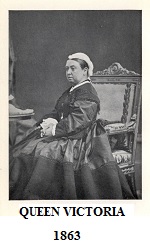|
London Sights to See
Buckingham Palace
|

|
While many sites in this modern, yet ancient city could be used to epitomize the seat of British Empire, to most of the world, one building seems to be the seat of all that is British.
 Though long one of the most popular tourist attractions in the great city
of London, Buckingham Palace is still the official
residence of Britain's monarchy, as it has been since Queen Victoria so
designated it in 1837. Though long one of the most popular tourist attractions in the great city
of London, Buckingham Palace is still the official
residence of Britain's monarchy, as it has been since Queen Victoria so
designated it in 1837.
Much of the building was constructed as early as 1703 for the Duke of Buckingham.
Buckingham House (as it was then known) was purchased in 1762 by George III, who used it as a private residence. During the following 75 years the house was
expanded to form three wings around a central courtyard.
When Queen Victoria discovered the lack of several "necessary" rooms - such as a formal ballroom, a nursery, visitors' bedrooms and others -
major additions were undertaken, including adding an entire wing to form a quadrangle. The
Marble Arch was moved to Hyde Park, where it still resides near Speaker's
Corner. With a refacing with Portland stone in 1913, the palace received its last major change.

|
Still actively in use as both residence and offices, over 50,000 guests
and invited diplomats visit per year who interact with over 400
individuals for whom this is "the office". Despite its use as a home
for the royal family and an active office for affairs of state, several
parts of the palace are open to the public.
During August and September, the West Wing admits visitors who
|
can view the State Rooms. At other times of the year, various parts are open, where tourists can
view spectacular jewels, dressing gowns, furniture and the building
itself.
The Queen's Gallery near the Royal Mews (stables and, later, a garage) is open year-round and has an ever changing display of objects owned by the British nation. Here you can see original paintings by Rubens, Vermeer, Canaletto and other great artists.
The Royal Mews are also open to the public, where you can see 30 horses and the golden State
Coach. The four-ton coach, pulled by eight horses, is used for coronations and other state functions.
Outside, the 40-acre garden presents a peaceful walk full of
well-tended flowers and shrubs and a superb view of the lake.
Of course, the major attraction outside is the "Changing of the Guard",
or as it's more formally known: the Guard
Mounting.
Household Troops
have guarded the Sovereign since 1660, but today the task is carried
out at Buckingham by soldiers drawn mostly from the regiments of the Foot Guards.
During the changing of the guard, the guards' band plays a traditional
military march as one set of guards replaces the other in a formal and
choreographed manner. When the Queen is in residence, four sentries
stand at the front of the building. While she's away, the contingent is
reduced to two.
Clad in the traditional red tunic, and bearskins, together with their distinctive helmet, the Queen's guards are rigorously trained to avoid interacting with the
many visitors who try to distract them. Occasionally, other units of
the Commonwealth
units participate in guard duty, as do the Scots Guards and the
Brigade of Gurkhas.
The Guard Mounting ceremony is performed at 11:30 am and lasts for
about 45 minutes, though it's occasionally skipped due to inclement
weather. The Palace location is easily accessible by the tube (the London Underground
subway system). Green
Park is to the north of Buckingham Palace, Victoria Station and St. James Park stations are to the south.
Buckingham Palace
London
SW1A 1AA
United Kingdom
Tel: 020 7766 7300
Travel Blog | Sitemap
Sights to See in London
How to Start a Home Based Travel Business at Buckingham Palace in London
|

